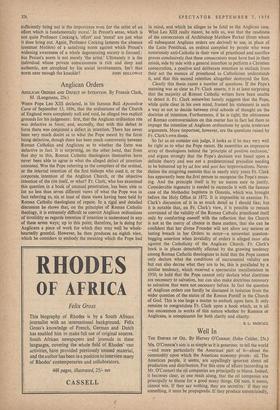Anglican Orders
ANGLICAN ORDERS AND DEFECT OF INTENTION. By Francis Clark, SJ. (Longmans, 25s.)
WHEN Pope Leo XIII declared, in his famous Bull Apostolicce Carte of September 13, 1896, that the ordinations of the Church of England were completely null and void, he alleged two explicit grounds for his judgement : first, that the Anglican ordination rite was defective in form; and, secondly, that with this defect in form there was conjoined a defect in intention. There has never been very much doubt as to what the Pope meant by the form being defective, though there has been much controversy between Roman Catholics and Anglicans as to whether the form was defective in fact. It is surprising, on the other hand, that from that day to this, Roman Catholic theologians themselves have never been able to agree in what the alleged defect of intention consisted. Was the Pope referring to the compilers of the ordinal, or the internal intention of the first bishops who used it, or the corporate intention of the Anglican Church, or the objective intention of the rite itself, or what? Fr. Clark, who has examined this question in a book of unusual penetration, has been able to list no less than seven different views of what the Pope was in fact referring to, six at least of these views having been held by Roman Catholic theologians of repute. In a rigid and detailed discussion he shows that, on the principles of Roman Catholic theology, it is extremely difficult to convict Anglican ordinations of invalidity as regards intention if intention is understood in any of these seven ways; up to this point, therefore, he is doing for Anglicans a piece of work for which they may well be whole- heartedly grateful. However, he then produces an eighth view, which he considers to embody the meaning which the Pope had in mind, and which he alleges to be fatal to the Anglican case. What Leo XIII really meant, he tells us, was that the readiness of the consecrators of Archbishop Matthew Parker (from whom all subsequent Anglican orders are derived) to use, in place of the Latin Pontifical, an ordinal compiled by people who were notoriously anti-Catholic in their view of priesthood and sacrifice proves conclusively that these consecrators must have had in their minds, side by side with a general intention to perform a Christian consecration, a positive and deliberate intention to exclude from their act the essence of priesthood as Catholicism understands it, and that this second intention altogether destroyed the first.
Clearly this thesis raises a number of questions. If the Pope's meaning was as clear as Fr. Clark asserts, it is at least surprising that the majority of Roman Catholic writers have been unable to detect it. Fr. Clark somewhat lamely suggests that the Pope, while quite clear in his own mind, framed his statement in such a way as not to decide between rival schools of thought on the doctrine of intention. Furthermore, if he is right, the obtuseness of Roman controversialists on this matter has in fact led them to impugn the intention of Anglican ordinations by quite irrelevant arguments. More important, however, are the questions raised by Fr. Clark's own thesis.
So far as an outsider can judge, it looks as if he may very well be right as to what the Pope meant. He assembles an impressive array of theologians behind the 'principle of positive exclusion,' and argues strongly that the Pope's decision was based upon a definite theory and was not a predetermined prejudice needing to be bolstered up by ad hoc and post hoc improvisations. Never- theless the misgiving remains that in nearly sixty years Fr. Clark has apparently been the first person to recognise the Pope's mean- ing. And the principle itself is by no means easy to justify. Considerable ingenuity is needed to reconcile it with the famous case of the Methodist baptisms in Oceania, which was brought before the Holy Office in 1872. It is impossible to examine Fr. Clark's discussion of it in as much detail as I should like; but it is notable that, on Fr. Clark's view, it is possible to remain convinced of the validity of the Roman Catholic priesthood itself only by comforting oneself with the reflection that the Church is not at the mercy of chance in these matters, that she can be confident that her divine Founder will not allow any serious or lasting breach in her Orders to occur—a somewhat question- begging assertion when invalidity of orders is alleged inter alia against the Catholicity of the Anglican Church. Fr. Clark's book is in places detectably affected by the growing tendency among Roman Catholic theologians to hold that the Pope cannot only declare what the conditions of sacramental validity are but can also decree what they are to be; this is paralleled by a similar tendency, which received a spectacular manifestation in 1950, to hold that the Pope cannot only declare what doctrines are necessary to salvation, but can also make doctrines necessary to salvation that were not necessary before. In fact the question of Anglican orders can hardly be discussed in isolation from the wider question of the status of the Roman Pontiff in the Church of God. This is too large a matter to embark upon here. It only remains to congratulate Fr. Clark upon a book which, as is all too uncommon in works of this nature whether by Romans or Anglicans, is conspicuous for both clarity and charity.
E. L. MASCALL


































 Previous page
Previous page